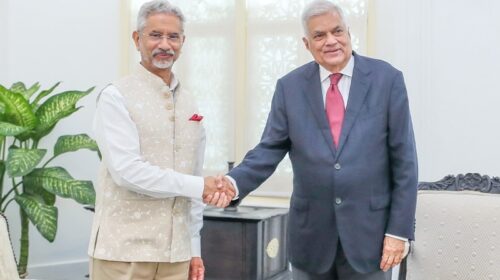Indo-Lanka joint energy projects dominate bilateral talks between Jaishankar and Wickremesinghe
 Colombo, Jun 20 (PTI) External Affairs Minister S Jaishankar and Sri Lankan President Ranil Wickremesinghe held bilateral discussions on Thursday, where joint energy projects, including a proposed petroleum pipeline linking the two countries, took centre stage.
Colombo, Jun 20 (PTI) External Affairs Minister S Jaishankar and Sri Lankan President Ranil Wickremesinghe held bilateral discussions on Thursday, where joint energy projects, including a proposed petroleum pipeline linking the two countries, took centre stage.
The two leaders focused on initiatives aimed at enhancing energy connectivity and developing the renewable energy sector.
“Significant attention was given to plans for a Liquified Natural Gas supply, a proposed petroleum pipeline linking the two countries, and advancing oil and gas exploration projects,” an official press release said.
It was announced that construction of the solar power plant in the eastern district of Trincomalee is set to commence next month.
The discussions also covered projects supported by the Indian government to enhance Sri Lanka’s liquid milk industry and fertiliser production.
Jaishankar and Wickremesinghe also discussed India’s support for developing Trincomalee and expanding the Kankesanthurai port in the north.
The ongoing development of Jaffna Airport and Colombo Airport with Indian assistance was also a key topic, alongside the acceleration of Sri Lanka’s unique digital identity card project, marking a significant step towards the country’s digitisation efforts.
A highlight of the engagement was the formal commissioning of the Maritime Rescue Coordination Centre (MRCC), comprising a main centre in Colombo and a sub-centre in Hambantota, the location of the Chinese-funded port.
Jaishankar arrived here early in the morning. It is his first visit in his second consecutive term in office.
The visit comes at a time when Sri Lanka’s Supreme Court on Tuesday gave Prime Minister Dinesh Gunawardena, the Cabinet and the Adani Group three weeks to file preliminary objections to a petition filed by an environmental group against the wind power project undertaken by the Indian conglomerate at Mannar in the northeast region.
Meanwhile, some opposition members in Parliament raised concerns about the short length of Jaishankar’s visit, claiming it was a means to pressurise Sri Lanka over projects.
The Sri Lankan government has been maintaining that the Adani group investment was vital to achieving its target of 70 per cent of its power needs to renewable energy sources by 2030. In May, the government approved a 20-year power purchase agreement with Adani Green Energy to develop 484-megawatt wind power stations in the northeast region.